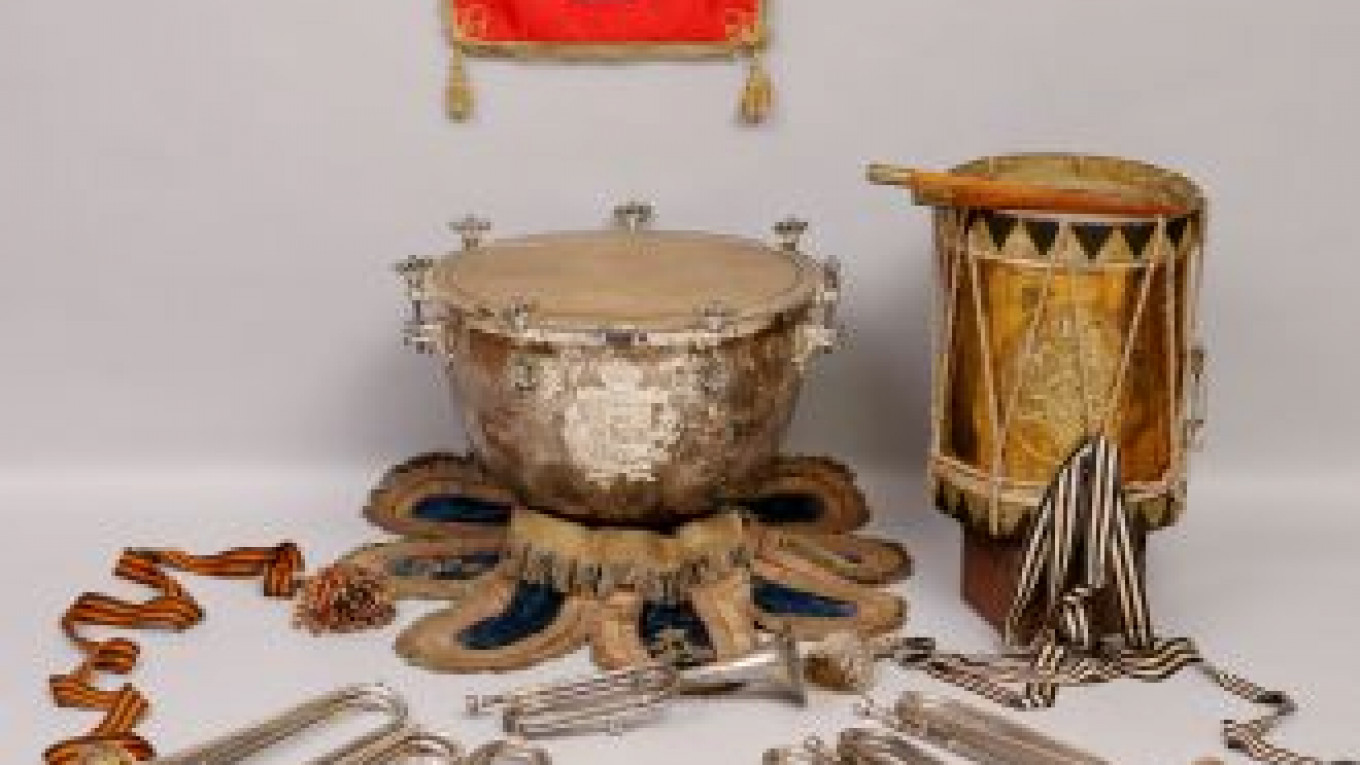The Prokofiev Hall of the Glinka Museum of Musical Culture will resound Thursday with the blare of trumpets and the beat of drums, all of them nearly 200 years old, in the first of a series of concerts by members of the Central Concert Orchestra of the Russian Navy devoted to military music of the 18th and 19th centuries from Russia and other parts of Europe.
The trumpets in question are instruments of silver presented as awards to regiments of the Russian army for their accomplishments in battle during the Napoleonic Wars, and the drums are trophies of the same epoch captured from the French. All are part of the Glinka Museum’s extensive collection of musical instruments, and all have recently undergone extensive restoration.
Taking its title, “Let the Thunder of Victory Sound,” from the opening words of Russia’s first national anthem, composed in 1791, the series is due to present music from the reigns of Peter the Great, Catherine the Great and Nicholas I, as well as music of French origin from the Napoleonic era.
Music initially developed as an important element of warfare in Western Europe during the 16th and 17th centuries and was taken up in Russia during the early 1700s, following the establishment by Peter the Great of the country’s first standing army. Its purpose was both to inspire the troops on and off the battlefield and to serve as a means of communication in the heat of battle. In the words of Alexander Suvorov, generalissimo of Russia’s armed forces during the reign of Catherine the Great, “Music doubles and even triples [the force of] the army, and with banners unfurled and the thunderous roar of music I captured Ismail,” referring to a decisive Russian victory over the Ottoman Empire in 1790.
The silver trumpets of the Glinka Museum collection seem mostly to be of German origin, though a few are probably the work of Russian craftsmen. Meant primarily as awards, they are likely to have been played only on special occasions. Some bear an inscription, such as, “For bravery in the face of the enemy at Fere-Champenoise, March 13, 1814,” which appears on several of the instruments known to have been presented to the Life-Guard Dragoons Regiment and refers to a famous victory over Napoleon’s army in northeastern France.
Restoration has involved removing accumulated grime and repairing damage suffered by the trumpets over the past two centuries. All of them are so-called “natural trumpets,” predating the introduction of the valve trumpet, and essentially limited to the note at which they are pitched and the overtones or harmonics of that note. The silver trumpets were originally pitched at the note of C, which was common in their time. The restorers have brought the pitch down a full step to today’s norm of B-flat.
The Glinka Museum provided an opportunity last week to take a close-up look at the trumpets and to hear a pair of them played in a brief bit of stirring warlike music. On display as well were the elegant polished brass shells of three captured French side drums, ready to be fitted out with their new calfskin drumheads.
Leading the entire series of concerts at the Glinka Museum will be Captain Alexei Karabanov, artistic director of the Navy orchestra since 2007 and a leading authority on military music of earlier times. Thursday’s program is devoted to music from the era of Peter the Great.
“There is a huge amount of music available,” Karabanov said at last week’s preview presentation of the instruments, “but most of it has come down to us in editions from the time of Catherine the Great.” Among the works he mentioned as part of the program will be marches of the Preobrazhensky and Semyonovsky regiments, both founded by Peter early in his reign and principal components of his army in the years to follow. Also to be heard will be music from Sweden, a march dedicated to King Charles XII, who was Peter’s most important foe in the Great Northern War at the beginning of the 18th century.
The next concert in the series, on Nov. 25, features music from the time of Catherine the Great, while music from the reign of Catherine’s grandson, Nicholas I, and of the French army is due to be heard at the series’ remaining concerts on Feb. 10 and March 24. Besides the silver trumpets and French drums, the Navy ensemble will include other instruments traditionally a part of Russian military bands, notably flutes and horns. And in addition to conducting, Captain Karabanov will provide a commentary on the music and its historical setting and significance.
The opening concert of “Let the Thunder of Victory Sound” takes place on Thursday at 7 p.m. at the Glinka
Museum of Musical Culture, located at 4 Ulitsa Fadeyeva. Metro Mayakovskaya, Novoslobodskaya. Tel. 739-6226, www.glinkamuseum.ru.
A Message from The Moscow Times:
Dear readers,
We are facing unprecedented challenges. Russia's Prosecutor General's Office has designated The Moscow Times as an "undesirable" organization, criminalizing our work and putting our staff at risk of prosecution. This follows our earlier unjust labeling as a "foreign agent."
These actions are direct attempts to silence independent journalism in Russia. The authorities claim our work "discredits the decisions of the Russian leadership." We see things differently: we strive to provide accurate, unbiased reporting on Russia.
We, the journalists of The Moscow Times, refuse to be silenced. But to continue our work, we need your help.
Your support, no matter how small, makes a world of difference. If you can, please support us monthly starting from just $2. It's quick to set up, and every contribution makes a significant impact.
By supporting The Moscow Times, you're defending open, independent journalism in the face of repression. Thank you for standing with us.
Remind me later.






